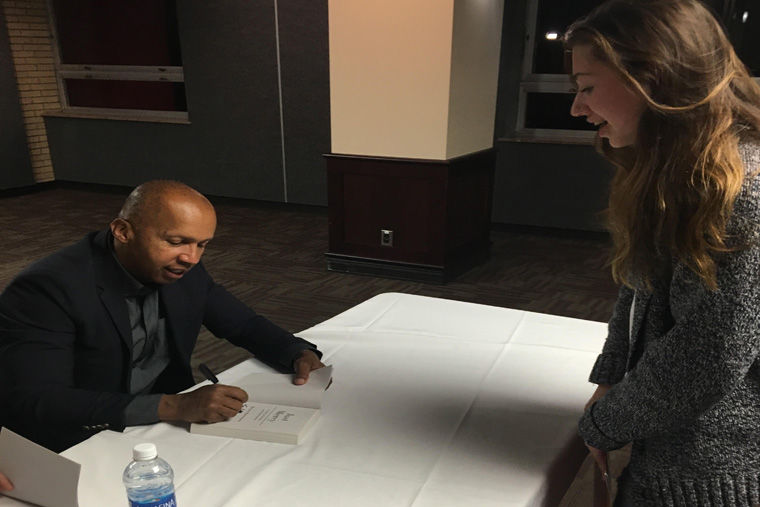Author speaks for Diversity Dialogue
Author Bryan Stevenson signs his book “Just Mercy” for freshman engineering major Claudia Cruz 6:30 p.m. Monday in the Carl Sandburg Auditorium. “I’ve been waiting for weeks for Bryan Stevenson to come to NIU,” Cruz said.
October 27, 2016
DeKALB | Bryan Stevenson, author of Common Reading Experience book “Just Mercy,” visited NIU to talk about his book and the implications it makes about a broken criminal justice system.
Stevenson said the criminal justice system is broken when dealing with minorities and crime. He discussed his experience as a lawyer and the lessons he has learned about social justice 6:30 p.m. Monday in the Carl Sandburg Auditorium.
The Common Reading Experience is facilitated by First- and Second-Year Experience and aims to unite new students by encouraging them to read the same novel. The event was part of the Diversity Dialogue series, which is being held by the Office of Academic Diversity, Equity and Inclusion to give members of the NIU community the opportunity to engage in civil discourse.
“The Common Reading Experience gives us a chance to come together as a university community to discuss important topics that affect learning to the greater world events and expand our perspectives,” President Doug Baker said. “The issues discussed in ‘Just Mercy,’ [including] mental health, racism, socioeconomic disparities, injustice in the criminal justice system and others, are [issues] that affect all of us.”
Stevenson said the criminal justice system is not fair to members of minority groups, and he described how he believes people can make a change.
“The first thing we’ve got to do if we want to change the world is create an identity rooted in compassion and kindness,” Stevenson said. “The second thing we have to do if we are going to change the world is we have to stay proximate to the people and places that we care most deeply about. We cannot change the world from a distance.”
Stevenson said making a difference in the criminal justice system isn’t always easy. He described an incident involving a young boy with a disability facing the death penalty. He did everything he could to help this boy, but the case failed because his disability was presented too late.
After this incident, Stevenson questioned his career as a lawyer. He began to see that all of his clients were people broken by poverty, racism, neglect and a flawed legal system. Stevenson said he realized that he chose this career path because he is broken too.
“When you do uncomfortable things, it will break you,” Stevenson said. “It’s in brokenness that we understand what it means to be fully human. It is the broken that can teach us the way compassion works. It is the broken that understand how mercy works. It is the broken that can teach us and lead us to justice, redemption and restoration.”
Stevenson used his own experience with injustice to illustrate how students can make a change and encouraged attendees to reflect on their own experiences, too.
“I really loved [this event],” said freshman psychology major Amber Gilbert. “It made me rethink a little bit of what I wanted to do. I still want to help people with mental disabilities. I want to be a therapist, and maybe my place to be is to help people in prisons because they are also struggling. I learned that the best way to make a difference is to keep going and keep pushing my boundaries.”







